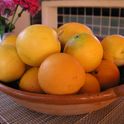(Cake flour) How can I make whole wheat flour more like cake flour? Thanks, kc
5 Comments
Shuna L.November 14, 2014
I like the idea of triple sifting whole wheat flour to make it "softer." It's an interesting concept. But I wonder: why buy whole wheat flour, only to triple-sift the whole wheat out of it? Also, not all whole wheat flours are created equal. Meaning - even if they are not labeled "bread," they could be much higher in gluten than standard "cake" flour.
I find that AP flour generally works for all cakes unless supersoft tenderness is truly needed - as with white cakes. I have begun using whole wheat pastry flour again and I like that it's "soft" but it's also nuttier and more flavorful because it's "whole."
There's another trick one can use to "soften" flour for a cake: subtract 10 - 20% of flour volume and replace with cornstarch or rice flour or arrowroot, or any flour without gluten... It's a nice way to teach oneself about low or no gluten flours, and their own distinctive characteristics, without forgoing wheat altogether.
Remember: all experiments can lead to delicious results. Happy baking!
I find that AP flour generally works for all cakes unless supersoft tenderness is truly needed - as with white cakes. I have begun using whole wheat pastry flour again and I like that it's "soft" but it's also nuttier and more flavorful because it's "whole."
There's another trick one can use to "soften" flour for a cake: subtract 10 - 20% of flour volume and replace with cornstarch or rice flour or arrowroot, or any flour without gluten... It's a nice way to teach oneself about low or no gluten flours, and their own distinctive characteristics, without forgoing wheat altogether.
Remember: all experiments can lead to delicious results. Happy baking!
catalinalacruzNovember 14, 2014
Shuna, despite the the multiple siftings, what remains is still whole wheat flour. Only the bran has been removed. You are correct: not all whole wheat flours are created equal. One can tell the gluten content by reading the contents. It is my understanding that the higher the protein content, the higher the gluten.
Yes, happy baking! Even a more coarse flour, such as whole wheat, will produce a delightful cake for the home baker.
Yes, happy baking! Even a more coarse flour, such as whole wheat, will produce a delightful cake for the home baker.
dotparkerNovember 12, 2014
Thank Uso much. Those answers were very helpful!
Lindsay-Jean H.November 12, 2014
Naomi Duguid emailed in and said the following: "I agree with the earlier answer and would add that if you can find whole wheat pastry flour, then if your regular whole wheat flour is too strong you can make the cake more tender if you blend the two, (after sifting) using pastry flour for 1/4 of the flour called for."
catalinalacruzNovember 12, 2014
I almost always, with few exceptions, use whole wheat flour for cake baking. Key is to sift the flour well, saving the bran separated by sifting for muffins or bread. A second sifting would produce an even finer flour. My favorite cake cookbook is The Cake Bible by Rose Levy Beranbaum. Her recipes almost always call for cake flour. I sift my wheat flour and carry on with her recipes. The results are stellar. Yesterday I baked her Cordon Rose Banana Cake for company. No one remarked that the cake was baked with whole wheat flour (I don't think they even noticed) and guests asked for seconds. Don't use bread flour. You want a flour that is low gluten (low protein) for cake baking. Because whole wheat flour contains the wheat germ, it will be higher in oil. For this reason, whole wheat flour should always be refrigerated for maximum freshness. Unrefrigerated whole wheat flour can take on a bitter flavor when the oil becomes rancid.
Showing 5 out of 5 Comments
Recommended by Food52
Popular on Food52
Continue After Advertisement


